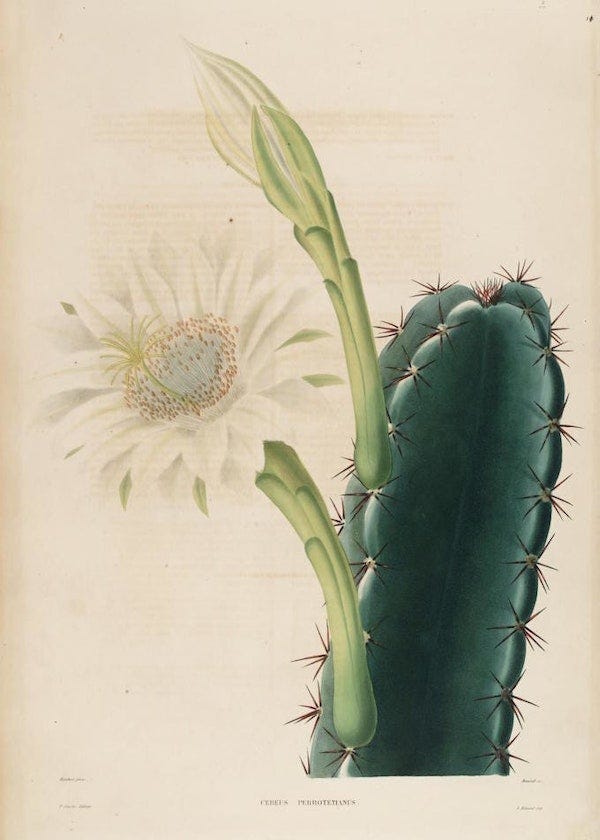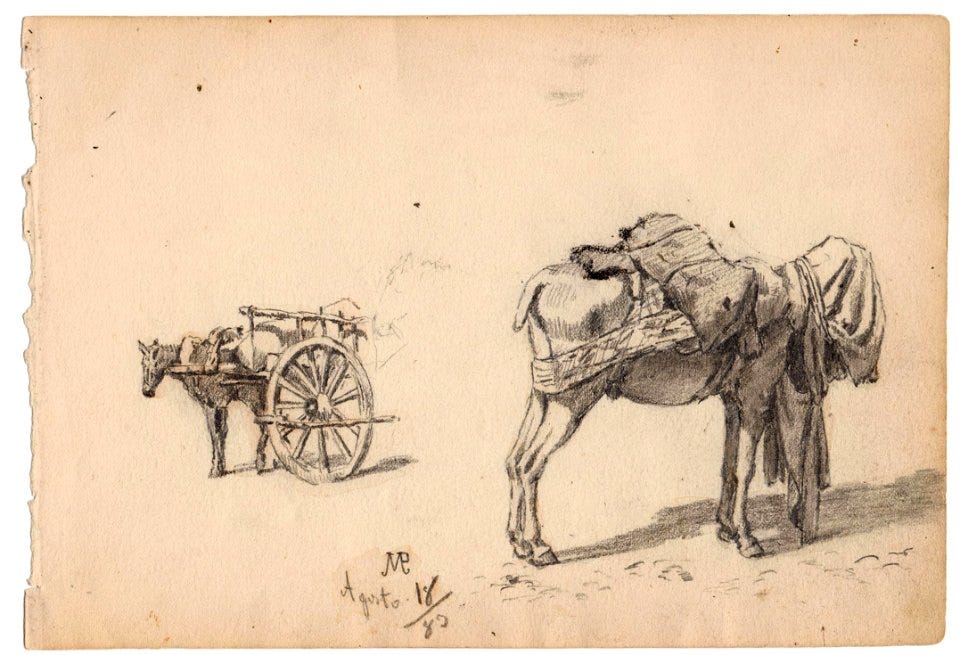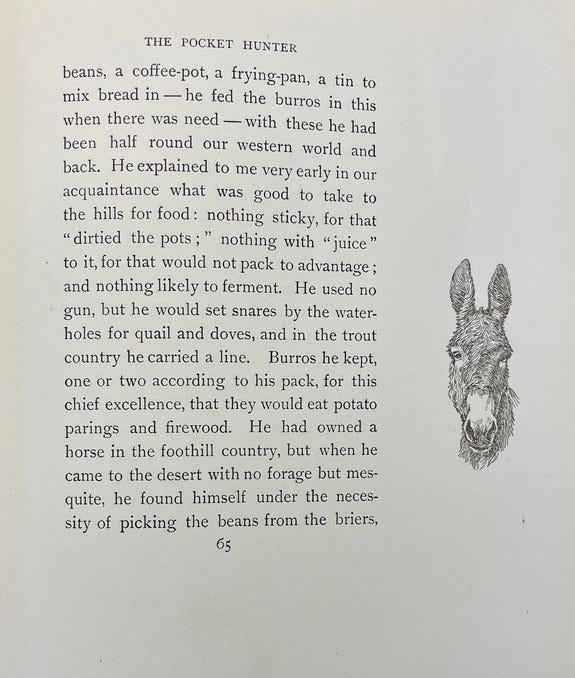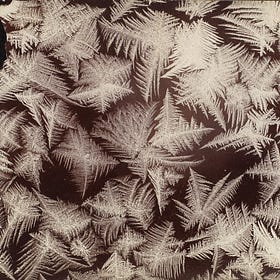Digging for Character
Mary Hunter Austin achieved fame as a writer of the places and peoples of the American West... In this passage, she describes a man known by his mysterious job title--'Pocket Hunter'
From Mary Hunter Austin, The Land of Little Rain
…on the level mesa nothing taller showed than Diana's sage. Over the tops of it, beginning to dusk under a young white moon, trailed a wavering ghost of smoke, and at the end of it I came upon the Pocket Hunter making a dry camp in the friendly scrub. He sat tailor-wise in the sand, with his coffee-pot on the coals, his supper ready to hand in the frying-pan, and himself in a mood for talk. His pack burros in hobbles strayed off to hunt for a wetter mouthful than the sage afforded, and gave him no concern.

We came upon him often after that, threading the windy passes, or by water-holes in the desert hills, and got to know much of his way of life. He was a small, bowed man, with a face and manner and speech of no character at all, as if he had that faculty of small hunted things of taking on the protective color of his surroundings. His clothes were of no fashion that I could remember, except that they bore liberal markings of pot black, and he had a curious fashion of going about with his mouth open, which gave him a vacant look until you came near enough to perceive him busy about an endless hummed, wordless tune. He traveled far and took a long time to it, but the simplicity of his kitchen arrangements was elemental. A pot for beans, a coffee-pot, a frying-pan, a tin to mix bread in—he fed the burros in this when there was need—with these he had been half round our western world and back. He explained to me very early in our acquaintance what was good to take to the hills for food: nothing sticky, for that "dirtied the pots;" nothing with "juice" to it, for that would not pack to advantage; and nothing likely to ferment. He used no gun, but he would set snares by the water-holes for quail and doves, and in the trout country he carried a line. Burros he kept, one or two according to his pack, for this chief excellence, that they would eat potato parings and firewood. He had owned a horse in the foothill country, but when he came to the desert with no forage but mesquite, he found himself under the necessity of picking the beans from the briers, a labor that drove him to the use of pack animals to whom thorns were a relish.
I suppose no man becomes a pocket hunter by first intention. He must be born with the faculty, and along comes the occasion, like the tap on the test tube that induces crystallization. My friend had been several things of no moment until he struck a thousand-dollar pocket in the Lee District and came into his vocation. A pocket, you must know, is a small body of rich ore occurring by itself, or in a vein of poorer stuff. Nearly every mineral ledge contains such, if only one has the luck to hit upon them without too much labor. The sensible thing for a man to do who has found a good pocket is to buy himself into business and keep away from the hills. The logical thing is to set out looking for another one. My friend the Pocket Hunter had been looking twenty years. His working outfit was a shovel, a pick, a gold pan which he kept cleaner than his plate, and a pocket magnifier. When he came to a watercourse he would pan out the gravel of its bed for "colors," and under the glass determine if they had come from far or near, and so spying he would work up the stream until he found where the drift of the gold-bearing outcrop fanned out into the creek; then up the side of the canon till he came to the proper vein. I think he said the best indication of small pockets was an iron stain, but I could never get the run of miner's talk enough to feel instructed for pocket hunting. He had another method in the waterless hills, where he would work in and out of blind gullies and all windings of the manifold strata that appeared not to have cooled since they had been heaved up. His itinerary began with the east slope of the Sierras of the Snows, where that range swings across to meet the coast hills, and all up that slope to the Truckee River country, where the long cold forbade his progress north. Then he worked back down one or another of the nearly parallel ranges that lie out desertward, and so down to the sink of the Mojave River, burrowing to oblivion in the sand,—a big mysterious land, a lonely, inhospitable land, beautiful, terrible. But he came to no harm in it; the land tolerated him as it might a gopher or a badger. Of all its inhabitants it has the least concern for man.
What we love about this excerpt….

In this excerpt from ‘The Pocket Hunter,’ one of the sections that make up Land of Little Rain, Austin immerses her readers in the hyper-local. The character of the pocket hunter is that strange thing: a deeply engaging presence yet with few characteristics. Austin presents him by way of carefully described features of his way of life, the land, and the weather. By describing him like this, she seems to be implicitly asking us to do our own bit of metaphorical digging, encouraging us to find that pocket of pure ‘ore’ in a person’s complex, alloyed character.
Hunter gets relatively far in her story before telling us exactly what a ‘pocket hunter’ is. Perhaps this is because her detailed descriptions project such authority and trust that many readers—unaccustomed to the jargon of mining—take her at her word and read on despite the unfamiliarity of this key term.
About the author
Mary Hunter Austin (1868-1934) was an environmentalist, activist, and one of the first prominent women writers of the American West. The Land of Little Rain brought her acclaim and she has remained a critical—if not always popular—touchstone in American literature. Her play 'The Arrow Maker' had a successful Broadway premiere in 1911, and she continued to write works for the theatre that portrayed her strong interests in the natural environment and native peoples.
To read alongside...
We have featured other American women writers of place from the same time period. Check out past newsletters featuring works by Willa Cather and Alice Dunbar-Nelson
Hardscrabble Times on the Prairie
Then came the hard times that brought every one on the Divide to the brink of despair; three years of drouth and failure, the last struggle of a wild soil against the encroaching plowshare. The first of these fruitless summers the Bergson boys bore courageously. The failure of the corn crop made labor cheap.
LitFlash: A Poetic Escape from Winter
Soft breezes blow and swiftly show
Through fragrant orange branches parted,
A maiden fair, with sun-flecked hair,
Caressed by arrows, golden darted.
The vine-clad tree holds forth to m
Suggest a LitHit!
Tell us your own favourites from literature you've read, and become a Guest Curator. Just email us with the following information:
Your full name (and whether you want to be named or be anonymous in the newsletter—either option is fine!)
The title of the book you're suggesting
The location of the excerpt within the book (e.g., "in the middle of chapter 5"), or the excerpt itself copied into the email or attached to it (in Word)
Why you love it, in just a few sentences
**Please note that we welcome all suggestions but at the moment we can only release excerpts that are out of copyright and in the public domain. This means 75 years or more since the author's death. You can find many such out-of-copyright texts on the internet, for example at Project Gutenberg and Standard Ebooks.
About LitHits
You might also enjoy...
Writers Make Worlds: https://writersmakeworlds.com/
The Ten Minute Book Club: https://www.english.ox.ac.uk/ten-minute-book-club
Project Gutenberg: https://www.gutenberg.org/
Standard Ebooks: https://standardebooks.org/
The Poetry Foundation: https://www.poetryfoundation.org/
“Five Tips to Get Reading Again if You’ve Struggled During the Pandemic,” The Conversation (8 January 2021): https://theconversation.com/five-tips-to-get-reading-again-if-youve-struggled-during-the-pandemic-152904
Feedback
We'd love to hear your thoughts on our newsletter:
kirsten@lit-hits.co.uk
Graphic design by Sara Azmy
All curation content © 2024 LitHits. All rights reserved.






